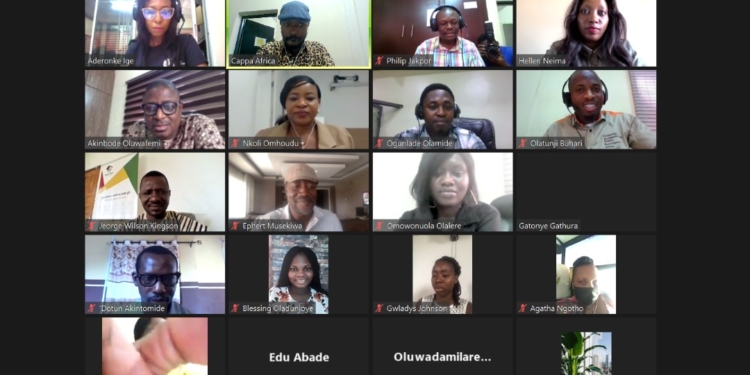Director of Health of Mother Earth Foundation (HOMEF), Dr. Nnimmo Bassey has cautioned African governments anticipating that the continent will develop through fossil fuels extraction and investments in dirty energy to brace up to the fact that the African continent will soon become dumping ground for obsolete technology as the rest of the world move away from fossil fuels.
Bassey also said that beyond the health hazards associated with extractivism, the African continent is now replete with exploitative markets, militarized communities, and contract labour that keep the people in bondage and the continent under-developed.
The HOMEF director made these remarks during his presentation on ‘Fossil Fuels Industry & Climate Change’ at a two-day virtual journalism training on climate change reporting in Africa organised by Corporate Accountability & Public Participation Africa (CAPPA) which had journalists from Cameroon, Ghana, Kenya, Nigeria, South Africa, and Uganda.
The journalism training was organized with the aim of raising the bar in climate reporting in the African region; To amplify the ‘Make Big Polluters Pay campaign’ and the Liability Roadmap within the region; and to birth a journalist network on climate reporting in the African region.
Bassey also listed oil extraction and gas flaring, coal mining, and gold mining, as some of the extractive activities that have unleashed what he described as “ecocide” on the continent, even as he warned that new projects such as the $11 billion Dangote Refinery and Polypropylene Plant in the Lekki Free Trade Zone area of Lagos would further aggravate the situation.
According to him, capitalist development which has kept Africa underdeveloped since the nineteenth century has been powered by coal, oil, and gas even as he added that extractivist pathways have been entrenched as a mechanism for colonial and neo-colonial plunder and construction of dependency.
In her intervention, Ndivile Mokoena, project officer of GenderCC – Women for Climate Justice, stressed that in climate reports emanating from Africa the focus is always the environment, with little or no emphasis on the intersectional impacts of climate change such as gender, socio-political and economic impacts.
With specific emphasis on gender impacts, Ndivile stressed that while women carry some of the greatest burdens of the environmental and climate crisis on the continent, they are usually left out in the decision-making and solutions pathway.
Mokoena thereafter recommended the participation of women and vulnerable groups in environmental and climate change policies; Change of current energy models; new food for food justice and switch to renewables.
She also stressed on the need for “mitigation measures to reduce greenhouse gas emissions, Adaptation to deal with climate change and preparing future coping mechanisms, and divestment, among others.”
READ ALSO – https://bonewssng.com/bridging-disability-inclusion-gaps-in-lagos-climate-change-discourse/
Speaking on ‘What Makes a Good Story’, Mr. Akinbode Oluwafemi, Executive Director of CAPPA, said that the quality of reports on climate change emanating from the continent informed the need to organize the training, stressing that, journalists need to be more focused in their reportage.
He also added that it is important for journalists to always incorporate the voices of ‘common citizens and affected communities’ in their stories.
During his presentation on ‘Introduction to Climate Change Reporting’, Philip Jakpor, Director of Programmes, CAPPA took the journalists through the missing links in climate reporting and highlighted the need for journalists to always hold the polluters accountable.
“Beyond reporting about the situation, journalists must begin to make ‘call to action’, which would hold the polluters accountable.”
Other resource persons at the training were; Rachel Rose Jackson of Corporate Accountability who made a presentation on ‘The case for holding Big Polluters liable’; Hellen Neima, Regional Director of Corporate Accountability Climate Campaign who spoke on ‘Understanding Climate Treaties and Conventions’; and Jesse Bragg, Media Director of Corporate Accountability who spoke on Capturing the International Audience.
The virtual journalism training was targeted at raising a crop of journalist on the African continent with sufficient knowledge of Climate Change reporting.

